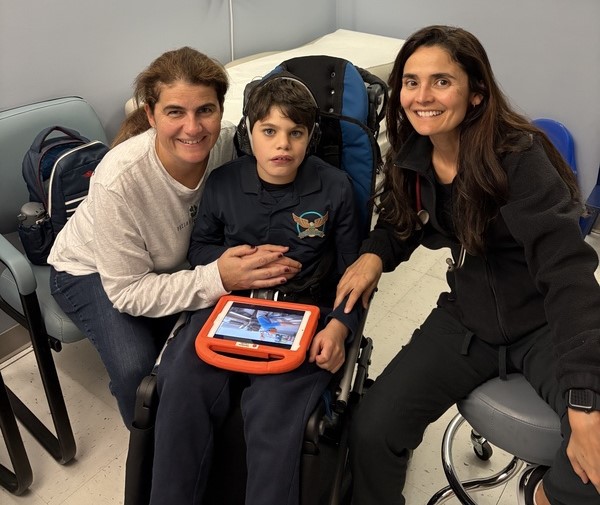Matthew was born with a rare genetic disorder called Phelan-McDermid syndrome (PMS). At the time of his diagnosis in 2016, he was one of only 700 people in the world with the condition. Today, there are less than 3,800 worldwide with the diagnosis.
“Since Matthew is a twin, we noticed differences between his development and that of his brother right away and sought medical intervention early on,” said his mother, Martha. He was first diagnosed with autism but was later confirmed to have PMS after genetic testing through Nicklaus Children’s Hospital’s Undiagnosed Disease Clinic, which offers comprehensive testing for rare and complex disorders that can be difficult to diagnose.
Dr. Parul Jayakar, Matthew’s geneticist and Director of the Undiagnosed Disease Clinic, said, “PMS is a very rare genetic condition that affects development, speech, cognitive ability and behavior, as a result of a deletion of a chromosome called 22q13. Children with PMS can have intellectual and physical disabilities, requiring long-term care and medical attention,” she said. “Getting a diagnosis helps him get enrolled in clinical trials which may offer newer treatments for these rare conditions.”
As Matthew experiences epileptic seizures, gastrointestinal issues and developmental delays, his medical care is managed by a Nicklaus Children’s team of neurologists, geneticists, hematologists, gastroenterologists, physical and occupational therapists, and a speech therapist, who work together to ensure Matthew’s daily life is optimal.
In addition to the medical attention, Matthew requires round-the-clock care to ensure his safety. For example, he requires supervision to ensure he does not eat non-food items and needs assistance with daily tasks such as bathing, getting up and sitting down, or going up a flight of stairs.

“Although he has many challenges, Matthew radiates pure love and joy,” says Martha. He teaches us and all those around him valuable lessons each and every day.” At home he receives around-the-clock personal care as he is unable to speak, feed himself or use the bathroom. “He depends on his parents and caregivers for every aspect of life. Our goal is to keep him thriving and happy,” said Martha.
Dr. Paula Schleifer, Director of the Division of Neurology at Nicklaus Children’s says, “our goal for children with rare conditions like Matthew, is to provide the best possible quality of life while partnering with families to help support them throughout the care journey. The family support is the central piece in the care for a child with special needs. Matthew’s progress is not only a reflection of the multidisciplinary care environment we strive for, but above all, a reflection of the dedication and strength of his family who have sought out all possible therapies and treatments to give him the best possible outcome.”
Martha and her family are advocating to raise awareness of PMS, through the Phelan-McDermid Syndrome Foundation and other community supporters.
“When we received Matthew’s diagnosis eight years ago, we were completely lost,” recalls Martha. “We were blessed to have found organizations and community supporters to help with resources, information, support and guidance through the years.”
“It is our hope that we can find a possible cure or treatment for children with PMS during Matthew’s lifetime,” she said.
Follow Matthew’s journey at @teammatthewluis
